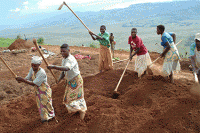Protecting wetlands to sustain human life
Wetlands cover over 10% of Rwanda’s territory. More than 100 lakes and 800 rivers in the country supply the population with food, crops and water for drinking, agriculture and hydro-electric power.
In 2006, the government, under the lead of the Rwanda Environmental Management Authority (REMA), joined the Ramsar Convention on Wetlands, the global treaty promoting the protection and wise use of wetlands. When joining the Convention, Rwanda designated the Rugezi marshes as a Ramsar Site, a wetland protected for its international importance.
The Rugezi wetland is a high altitude peatland located in northern Rwanda. The area is home to over 40 species of birds, including the endangered Grauer's Swamp-warbler. The wetland also supports over 500,000 local people dependent on agriculture for their survival.
Since 2003 water levels in the Rugezi wetlands had been dropping due to declining rainfall and over-cultivation, affecting the productivity of the Ntaruka hydropower station, one of the main electricity producers in the country. The economic loss for the years 2003-2007 has been estimated at over US$ 800,000.
In 2005, with the support of the World Bank and the Ramsar Convention, the government started restoring the Rugezi wetlands under the ‘Integrated Management of Critical Ecosystems Project’.
Various government ministries, including those responsible for environment, agriculture, livestock and forestry participated in the restoration efforts. Key to the success of the project was the involvement of the local population. Farmers agreed to adopt new cultivation practices to stop soil erosion around the marshes. They also enrolled in activities aimed at rehabilitating the degraded wetlands.
In 2008, the recovery was estimated at about US$ 150,000. The project helped create jobs and the restored wetlands started again to provide clean water, fish and crops.
Healthy wetlands provide communities with food and water for drinking, agriculture and sanitation, as well as means of transportation and source of income, thereby playing a key role in combating poverty.
Members of the Ramsar Convention have recognized this important role through a series of Resolutions and the development of the ‘Integrated framework for linking wetland conservation and wise use with poverty eradication’ in 2012.







